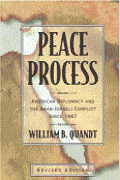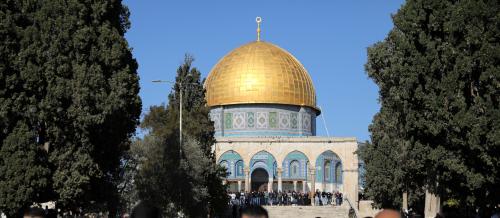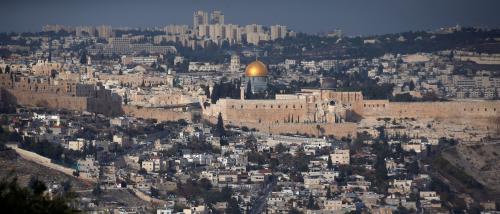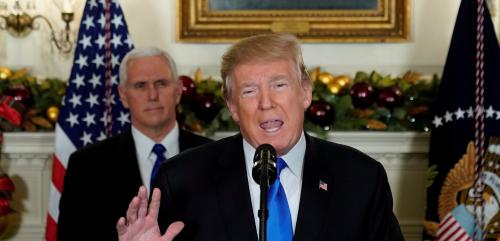Unless this president—or possibly the next—has the courage to take new and dramatic steps in the Israeli-Palestinian arena, the decades-old chapter of U.S. leadership on that issue may have come to a close, argues Hady Amr. This piece originally appeared on Foreign Policy.
We’re in trouble. The world, that is. Or at least those who pray for peace in Jerusalem and in the Holy Land.
Some track the current conflict back 100 years to a November 1917 British declaration—cursed by some, commemorated by others. Others to a November 1947 decision to partition Palestine into a Jewish state and an Arab state. But in the future, we may look back at Trump’s Jerusalem announcement this past week as a key turning point.
Before we get to the impact of Trump’s announcement, it’s essential to understand the current chapter of Israeli/Palestinian relations—both hope and hate—that began almost exactly 30 years ago. On Dec. 9, 1987, an Israeli military jeep plowed into a Palestinian vehicle in the Gaza Strip’s Jabaliya refugee camp, killing four. And when the Palestinian public in the West Bank and Gaza—from angry youth to conservative shopkeepers to progressive lawyers—rose up against the Israeli military occupation that dominated their lives, a civilian resistance that was part sit-ins and strikes, part rock-throwing, and part Molotov cocktail was born.
Imperfect as it was, it was that uprising—painful and hopeful—that was embraced by the West Bank and Gaza’s Palestinian society and spurred a series of events that led us to where we are today.
It was that 1987 uprising that inspired the Palestine Liberation Organization to bravely accept compromise via an emotional November 15, 1988 “Declaration of Independence” from their 1964 goal to “liberate Palestine” and achieve a “complete restoration of [their] lost homeland” to accepting even less than the 1947 partition—a state only on the West Bank and Gaza—a mere fifth of the Holy Land.
It was that 1987 uprising that transformed the Palestinian political position from the unrealistic to the pragmatic.
And the world took notice. Ordinary citizens in the Arab world were inspired by the prospects of people power. In a moment when the unthinkable was happening—the Berlin Wall fell, Nelson Mandela was released from prison—why couldn’t the age-old Israeli-Palestinian conflict be solved once and for all? And so U.S. President George H. W. Bush, with the wind of his success in liberating Kuwait at his back, brought together Israeli, Palestinian, and other Arab leaders at the Madrid Conference in the fall of 1991 based on the premise that the parties could negotiate a solution.
It was that 1987 uprising that a few years later, in 1993, inspired sworn enemies—Israeli Prime Minister Yitzhak Rabin and Palestine Liberation Organization Chairman Yasser Arafat—to shake hands on the White House lawn and sign the Olso Accords under the auspices of U.S. President Bill Clinton.
All of this was a result of the collective response of Palestinian civil society in the form of an uprising against their completely unsatisfactory situation. Then it was Israeli military occupation. Today it’s a failed peace process. It’s important to remember that uprising, because that force can rise up again.
But now, three decades and thousands of Israeli and (mostly) Palestinian deaths later, the hoped-for peace resulting in two states built on the cry of Palestinian civil society for dignity and independence, and the aspirations of Israelis to finally be accepted by the Arab world in a secure state of their own, is in deep trouble. Countless peace efforts—from Annapolis to Aqaba, including one I personally worked on under the auspices of Secretary of State John Kerry, and even an Arab Peace Initiative failed to achieve further progress.
Even before President Trump’s announcement, the Israeli-Palestinian peace process was already on the precipice: Palestinians were increasingly despondent that facts on the ground meant that it was no longer possible to achieve a state of their own in the West Bank and Gaza. Israelis themselves seem to have turned away from two states: Just weeks ago, Prime Minister Netanyahu stated firmly, “the Jordan Valley will always remain part of Israel. We will continue to settle it.” Indeed, the number of Israeli settlers in the West Bank’s 130 settlements has expanded from 270,000 when the 1993 peace deal was signed, to 400,000 today; 600,000 if East Jerusalem is included. But it’s not just the overall number of settlers. It’s about where they live. About 90,000 live deep in the West Bank on the Palestinian side of the Security Barrier, a number that rose 20,000 during the Barack Obama administration. As time passes, the situation becomes ever more complicated. Soon, we’ll reach a tipping point where neither Israelis nor Palestinians believe separation is possible.
Turning back to today, why is the status of Jerusalem such a massive deal? Deeply held religious views make Jerusalem absolutely vital to Christians, Jews, and Muslims around the world—and to Israelis and Palestinians on the ground. Decades ago, the international community wisely decided that since no group could live without it, everyone would need a stake in Jerusalem—by sharing it in some meaningful way—for peace to even have the possibility to prevail.
And why do U.S. views matter so much? Because as the broker of Israeli-Palestinian negotiations, at least the pretense that Washington would be neutral in negotiations—despite its longstanding support of Israel—was absolutely vital to bring the Palestinians into negotiations under U.S. auspices. Without the pretense of neutrality, Washington would not have the ability to mediate.
Without the pretense of neutrality, Washington would not have the ability to mediate.
So now, following Trump’s Jerusalem announcement, the results have been predictable: The PLO, which entered into the peace process decades ago based on U.S. assurances that all issues would be negotiated, is humiliated. The armed group Hamas is enraged. Arab leaders who may have wanted to support compromise will now find it more difficult to do so. Americans overseas (including diplomats) are less secure, as evidenced by the many security warnings issued by U.S. embassies. Israel, which has angered Arab populations throughout the region, is less secure and less likely to be accepted. And by turning our back on the international consensus once again—as we did in our withdrawal from the Paris climate agreement—we have lost the standing to lead in the eyes of the world.
But the most dramatic result is that Donald Trump’s declaration on Jerusalem seems to have completely disqualified the United States from its role as a broker in Israeli-Palestinian negotiations in the hearts of the Palestinian people themselves. And the dramatic reduction in U.S. influence over the process makes Israel itself less secure.
So where do we go from here? It’s anyone’s guess.
Trump’s Jerusalem announcement was an earthquake in Palestinian society. Now the Palestinian leadership is gathering to determine their answer. Will they cling to the sliver of hope that the White House stated it “recognizes that the specific boundaries of Israeli sovereignty in Jerusalem are subject to final status negotiations between the parties” and stick with the United States? Will they continue to strive towards a two-state solution but abandon Washington as the peace broker? And if so, will there be no broker? Or will another world power—Europe, Russia, China—or a group of them step in? Will they lead the Palestinian street in another uprising and, if so, will it be a peaceful resistance of Gandhi or a military resistance of de Gaulle? Will they undertake an international diplomatic uprising joining every international organization and pressing a case against Israel at the International Criminal Court? Or will they abandon the two-state paradigm and demand to live in one democratic state where Arabs and Jews live together with one person, one vote?
The good news is that, for now, the Palestinian Authority is holding steady and maintaining security cooperation with Israel. But it is Palestinian society writ large that may determine the future if it once again speaks with a collective voice.
Is there anything that the Trump administration can do to salvage the situation in the eyes of the Palestinians? The clarifications made during a Dec. 7 State Department briefing that the United States “is not taking or changing a position on the boundaries of sovereignty in Jerusalem” is completely falling on deaf ears in the Palestinian street. Although the PLO leadership might understand this nuance, it is unclear if that will affect its ability to manage public opinion.
What the United States could do—specifically on the question of Jerusalem—is encourage the government of Israel to change its policies there in a manner makes the Palestinians feel that they have a real stake in the Holy City’s future. That includes: Allowing the re-opening of the many Palestinian institutions in East Jerusalem closed in 2001, such as the Arab Chamber of Commerce. Announcing that if Palestinians hold legislative elections in 2018, Palestinian residents of East Jerusalem would be allowed to vote in those elections, as in the past. Halting the frequent denial of residency permits to West Bank spouses of Palestinians in East Jerusalem. And dramatically easing the restrictions on the ability of Palestinians to build housing for themselves, or even renovate, in East Jerusalem.
At this point, there are few words the United States could speak that would make a difference.
We will be judged by our own actions, and those of our ally, Israel.
As we learned through the uprising that began in 1987, it is the hopes, dreams, and actions of the Palestinian people who will shape the future. It will guide the actions of their leaders. It will form the views of the world. And will provoke a response from Israel.
But for better or worse, unless this president—or possibly the next—has the courage to take new and dramatic steps in this arena, the decades-old chapter of U.S. leadership in the Israeli-Palestinian arena may have come to a close. And who knows, given our failure thus far—in which I am admittedly complicit—that may not be such a bad thing.
The Brookings Institution is committed to quality, independence, and impact.
We are supported by a diverse array of funders. In line with our values and policies, each Brookings publication represents the sole views of its author(s).










Commentary
Jerusalem: After 30 years of hope and failure, what’s next for Israel/Palestine?
December 13, 2017